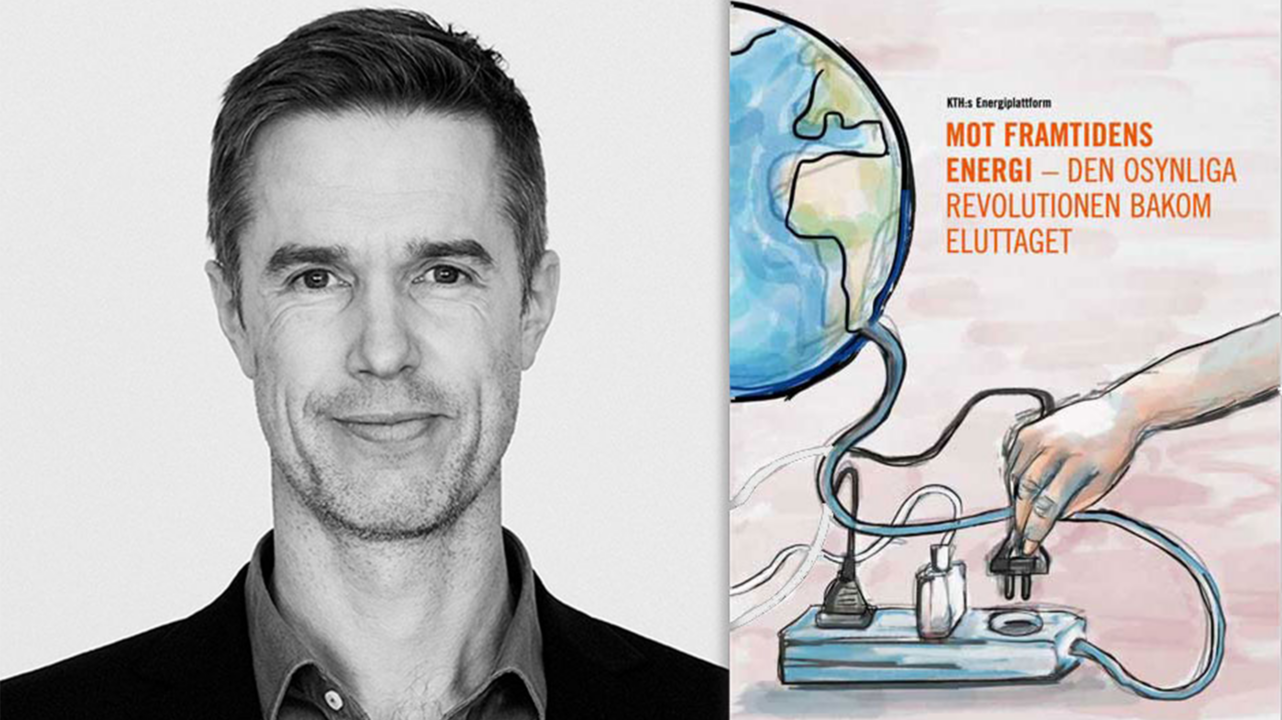The anthology “Towards the energy of the future – the invisible revolution behind the electrical socket” is here! In the book, researchers from the KTH Energy Platform discuss known and less known challenges and solutions concerning the energy of the future. VA researcher Fredrik Brounéus is one of the editors and co-authors of the book.

Why a book about energy?
”Because everything is about energy! Nearly all societal challenges and sustainability goals are in one way or another connected to how we produce, distribute and consume energy. The aim of the book is to stimulate dialogue and constructive debate on how to tackle the transition to a sustainable energy system.”
”The book explains why we need fossil fuels for a sustainable transformation; what is needed for renewable energy sources to have more widespread impact in society; how the “smart homes” of the future will restore a more direct relationship with energy; how cyber threats affect the energy system and how we can defend ourselves; why we need to think first, not to create new crises when the materials needed for the transition become scarce; why it is so hard to break our dependency on oil and gas; and how we all can become climate heroes by simple actions such as boiling less tea water.”
”Researchers develop the knowledge, politicians make the decisions, but it is we – the citizens, the public, or whatever we like to call us “ordinary people” – who are funding the research through tax money and who are electing the politicians with our ballots. To make informed decisions and to take part in the societal debate on energy, we need a better grasp on the issues at hand.”
You have mentioned that working with this book has changed your view of the world?
”Yes, I actually feel slightly enlightened by my new insights on how complicated and multifaceted the energy issue is. For instance, after reading one of Christophe Duwig’s chapters, I’ve drastically reduced the amount of water that I boil to make a cup of tea. It has also enhanced my understanding of how all energy sources entail a constant weighing of pros against cons, synergies against trade-offs.”
”Our transition to a sustainable society requires not only that we stop using fossil fuels, but also that we change how we invent and introduce new technologies in society. If not, we will keep painting ourselves into new corners. My newfound insights are naturally also affecting my friends and family. From having been moderately interested in energy I’ve found myself inclined to steer conversations into the subject. By the way, did you know that hydrogen … ”
The book is a collaboration between the KTH Energy Platform and VA. What is this energy platform, and how has the collaboration worked out in practice?
The KTH Energy Platform is an arena where different research groups at KTH can collaborate, both with each other and with external stakeholders. The aim is to create and communicate knowledge about energy that can contribute to a sustainable society. Since we at VA are keen to help researchers communicate, we were thrilled when Lina Bertling Tjernberg and Christophe Duwig (director and deputy director of the platform, respectively) suggested this collaboration.
”My VA colleagues Lotta Waesterberg Tomasson and Pelle Isaksson are the geniuses behind the book’s illustrations and design, respectively. A number of other colleagues have contributed via a course on popular science communication, which VA arranged for some of the researchers. Christophe Duwig and I are the editors of the book. While I have mainly been focusing on supporting the researchers in their writing processes, and on the language and structure of the chapters, Christophe has taken the lead on the composition of the book, and on the participation by different research groups at KTH.”
”This is VA’s second book collaboration (last year we published a book on antibiotic resistance together with researchers from Lund and Malmö universities, Swedish only). Both publications have been very rewarding, co-creative processes, where the researchers get new insights on popular science writing, while we at VA get to learn about cutting-edge research on societal challenges. Together we promote access to science-based knowledge in society.”
Is that the target group of the book – society as a whole?
”Yes, admittedly I’m partial, but I warmly recommend everyone to read this book. I promise it will give you a new perspective on the world – or your money back. No, better cut that last part. But the book is available for download free of charge.”
About the book
The book can be downloaded free of charge as a pdf (Swedish and English) via VA’s website. Alternatively, it can be bought as a paper book or e-book from bookstores or directly from the publisher.
Chapters and authors:
- What is energy? (Matthäus Bäbler & Fredrik Brounéus)
- What is electricity? (Lina Bertling Tjernberg)
- Energy in a historical perspective (Per Högselius)
- A sustainable society cannot afford to waste energy (Christophe Duwig)
- Shaping energy projects and policies with the UN Sustainable Development Goals (Francesco Fuso-Nerini)
- Oil (and gas) addiction (Christophe Duwig)
- Biomass (Henrik Kusar)
- Energy from faeces: harnessing energy from one of the most abundant materials on the planet (Daniel Ddiba)
- Back to the future with hydrogen (Ann Cornell)
- Materials – a tangible challenge for the electrification of society (Kerstin Forsberg & Christopher Hulme)
- Sustainable electricity grids – a prerequisite for the energy system of the future (Lina Bertling Tjernberg)
- Nuclear power of the future (Pär Olsson)
- Homes in the smart grid (Cecilia Katzeff)
- The Internet of Things (Carlo Fischione)
- Cyber security in the energy system (Fredrik Heiding)

